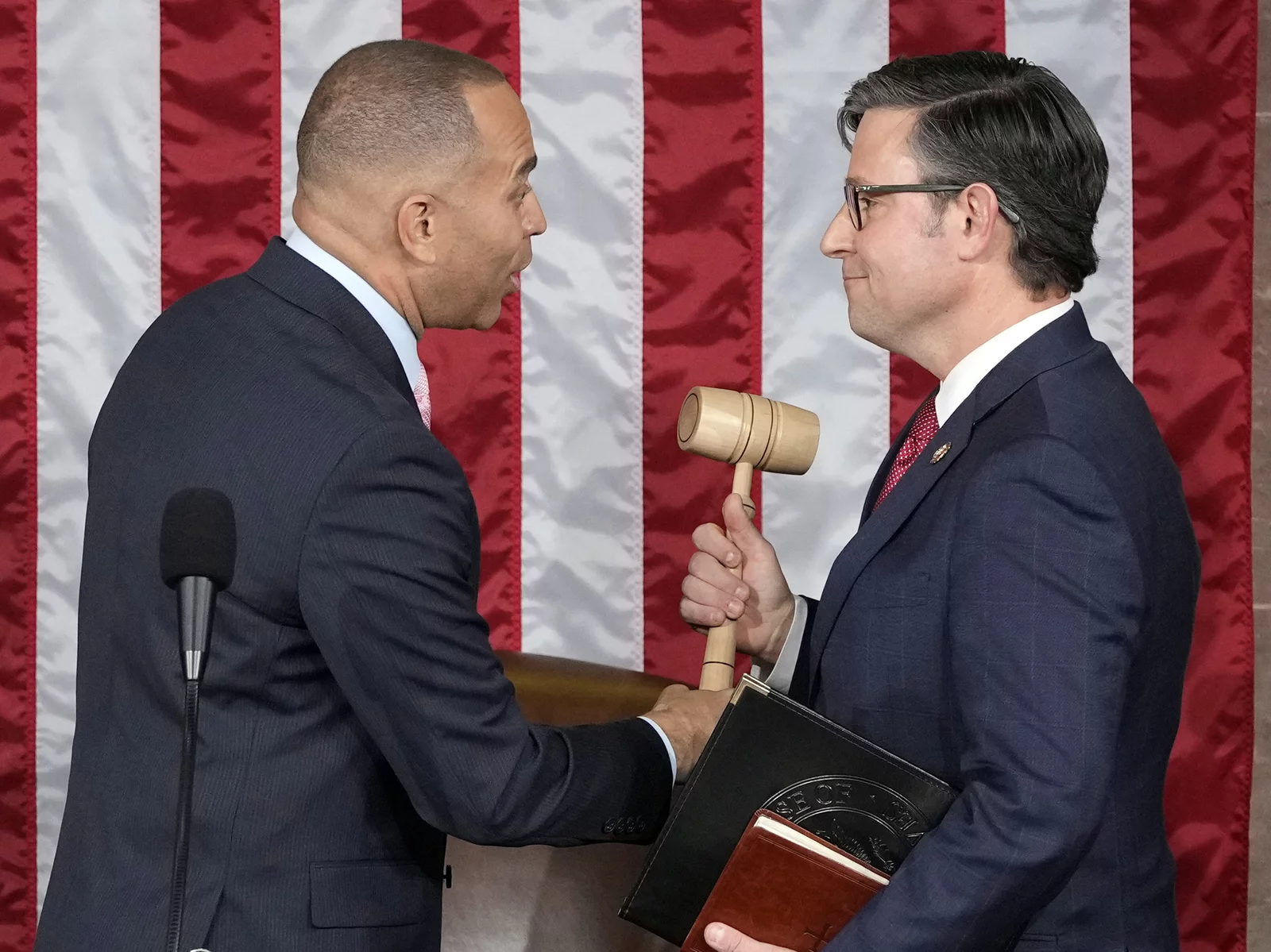
- Details
- By Levi Rickert
Rep. Mike Johnson (R-LA) on Wednesday was elected 56th speaker of the House after three weeks of complete chaos that brought work of the House to a standstill. The vote on Wednesday was 220-209 with all Republicans voting for Johnson and all Democrats voting for their House leader Hakeem Jeffries (D-NY).
Former Speaker McCarthy (R-CA) was voted out of the post on October 3, 2023. It was the first time in the United States Congress, the speaker of the House has been ousted.
Johnson was the fourth nominee put forth during the past three weeks by the House Republican conference. After Wednesday’s vote, Johnson was sworn in.
He assumes the speakership with just over three weeks before federal government funding expires on November 17. The House will also take up President Joe Biden’s request of $106 billion for Israel, Ukraine, and other foreign policy funding.
A relatively unknown, Johnson was first elected to the House of Representatives in 2016 after serving two terms in the Louisiana House.. Prior to being elected speaker, he served as the House Republican Conference vice chair, and former chair of the Republican Study Committee. Speaker Johnson most recently served on the Judiciary Committee and Armed Services Committee.
Johnson is a conservative who had the backing of four-times indicted former President Donald Trump. Johnson was on the GOP team of House members who defended Trump during his first impeachment inquiry.
On Wednesday, Native Americans that will serve in the 118th Congress voted down party lines. Republicans Josh Brecheen (Choctaw), from Oklahoma's 2nd congressional district; Tom Cole (Chickasaw) from Oklahoma's 4th congressional district voted for Johnson.
Democrats Sharice Davids (Ho-Chunk), from Kansas' 3rd congressional district, and Mary Sattler Peltola (Yup'ik) , who represents Alaska's at-large congressional district voted for Jeffries.
More Stories Like This
Native News Weekly (August 25, 2024): D.C. BriefsUS Presidents in Their Own Words Concerning American Indians
Indigenous Actor Elaine Miles Reports Detention by Alleged ICE Agents
Happy Thanksgiving from Native News Online
Coming Up on Native Bidaské: Behind the Animation: Joey Clift Talks “Pow” and Native Storytelling
Help us tell the stories that could save Native languages and food traditions
At a critical moment for Indian Country, Native News Online is embarking on our most ambitious reporting project yet: "Cultivating Culture," a three-year investigation into two forces shaping Native community survival—food sovereignty and language revitalization.
The devastating impact of COVID-19 accelerated the loss of Native elders and with them, irreplaceable cultural knowledge. Yet across tribal communities, innovative leaders are fighting back, reclaiming traditional food systems and breathing new life into Native languages. These aren't just cultural preservation efforts—they're powerful pathways to community health, healing, and resilience.
Our dedicated reporting team will spend three years documenting these stories through on-the-ground reporting in 18 tribal communities, producing over 200 in-depth stories, 18 podcast episodes, and multimedia content that amplifies Indigenous voices. We'll show policymakers, funders, and allies how cultural restoration directly impacts physical and mental wellness while celebrating successful models of sovereignty and self-determination.
This isn't corporate media parachuting into Indian Country for a quick story. This is sustained, relationship-based journalism by Native reporters who understand these communities. It's "Warrior Journalism"—fearless reporting that serves the 5.5 million readers who depend on us for news that mainstream media often ignores.
We need your help right now. While we've secured partial funding, we're still $450,000 short of our three-year budget. Our immediate goal is $25,000 this month to keep this critical work moving forward—funding reporter salaries, travel to remote communities, photography, and the deep reporting these stories deserve.
Every dollar directly supports Indigenous journalists telling Indigenous stories. Whether it's $5 or $50, your contribution ensures these vital narratives of resilience, innovation, and hope don't disappear into silence.
 The stakes couldn't be higher. Native languages are being lost at an alarming rate. Food insecurity plagues many tribal communities. But solutions are emerging, and these stories need to be told.
The stakes couldn't be higher. Native languages are being lost at an alarming rate. Food insecurity plagues many tribal communities. But solutions are emerging, and these stories need to be told.
Support independent Native journalism. Fund the stories that matter.
Levi Rickert (Potawatomi), Editor & Publisher

